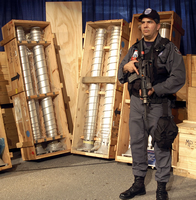Eight years after Moammar Gadhafi gave up his mail-order nuclear weapons program and chemical munitions in exchange for détente with the West, he has been chased from power by a ragtag rebel army backed by Western airpower. Chances are that Gadhafi regrets his decision to forgo his WMD programs. If he had been armed with nuclear or chemical weapons, NATO might not have intervened when he threatened to massacre his own people.
While Gadhafi's fall is good news, the end of the eccentric colonel's dictatorship now heightens the challenge of getting the Irans and North Koreas of the world to give up their nuclear ambitions in exchange for better relations with the West.
Before the bombs started falling on Tripoli, the intellectual and legal momentum behind such an intervention had been building for years. Through the work of academics and humanitarian advocates, the idea known as the "responsibility to protect," or R2P, has emerged as an increasingly mainstream norm among Western policymakers. R2P emphasizes the responsibility of states to protect their populations and permits international intervention if a government is unable or unwilling to prevent mass atrocities against its people.

